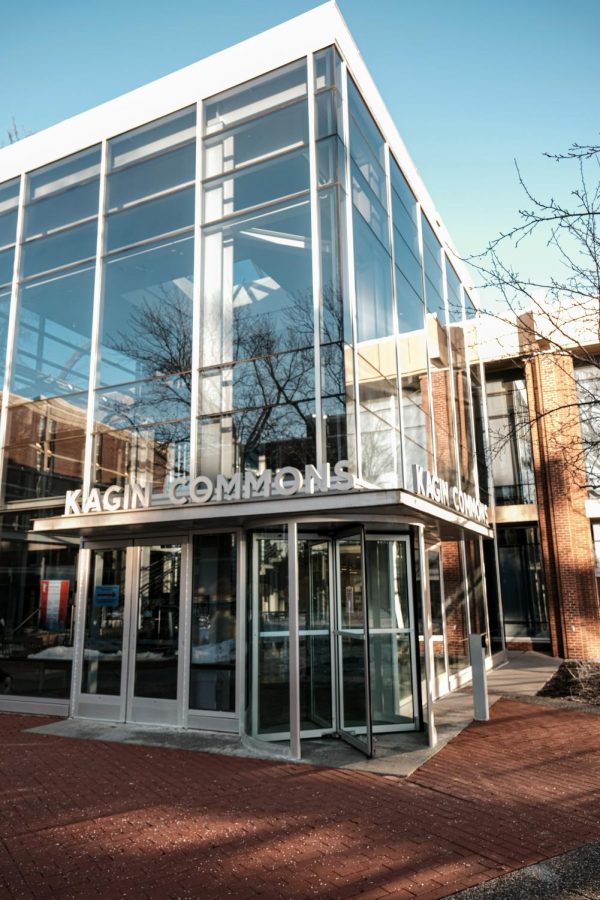DML rebrands: sets goals of furthering community engagement
February 16, 2023
The Lealtad-Suzuki Center for Social Justice (LSC), formerly known as the Department of Multicultural Life (DML), is reintroducing itself with a new name in a new division.
“It’s [been] a very long time in the making,” Hana Dinku, Director of the LSC said.
The Center’s new name honors the life and contributions of Dr. Catharine Deaver Lealtad and Esther Torii Suzuki. Lealtad, class of 1915, was the first African-American graduate of Macalester and later went on to become an accomplished medical doctor. Suzuki, class of 1946, was the first Japanese-American student at Macalester and a survivor of a Japanese internment camp, from which she was released to attend Macalester. The Center was first established in 2002 as a community space and a programmatic aspect of the DML.
The Assistant Director of the LSC, Mads Clark, said the new name reflected the Center’s commitment to community engagement and social justice.
“We all need to be engaged in social justice work across campus so we really wanted to make sure that we’re putting emphasis there,” they said.
The name change will not change the LSC’s fundamental mission, but instead expand it. The LSC will continue to operate the Gender and Sexuality Resource Center, work with student affinity groups and identity collectives, host gatherings at the Cultural House (C-House) and program campus events.
“[The name change] allows us to do the work [of multiculturalism] and we can do the educational work needed to make the kinds of changes that we need on this campus and in our communities,” Dinku said.
Ben Levy ’23, a student worker at the LSC, welcomed the change.
“‘Multicultural’ is an outdated term,” they said. “The new name offers more intentionality for what this space is supposed to be.”
This semester is also more of a soft launch for the LSC to reevaluate existing programs and look forward to new programs and events before the full launch coming fall of 2023. The LSC is also currently evaluating and revising their department mission statement.
“We really wanted to get feedback from our community about ‘What kind of spaces do we need? What are our programs? Essentially, what does our community need right now?’” Dinku asked.
One of the new programs coming up is the Critical Dialogue series, which Dinku hopes will help facilitate dialogue on campus, especially surrounding difficult and sometimes uncomfortable topics. More information about the program is forthcoming.
Restructuring within Macalester also put the Center in a new division. The LSC will now be under the Division of Institutional Equity, led by Vice President Alina Wong; previously, it was in the Division of Student Affairs.
Established in 2022, the Division of Institutional Equity is made up of the LSC, the Center for Religious and Spiritual Life (CRSL) and the Title IX Office.
“[The new structure] is really helpful,” Dinku said. “[Vice President Alina Wong and the incoming Dean] get to do some of the institutional-facing [responsibilities] like programs, projects and initiatives, and we can focus on creating educational programs and support programs for our students and the larger community.”
Looking ahead, the LSC will be working with the Community Engagement Center and other off-campus partners.
“We’ve started doing more transformational education programs,” Clark said. “So actually going off campus, whether it was a site tour like the Bdote tour, or the BIPOC mushroom foraging event, [or similar programs].”
Clark also emphasized the importance of getting out into the wider Minneapolis-St. Paul communities as well as creating spaces on campus.
“We’re getting out into the community and not just finding space on campus,” they said. “We are in such an [activism] rich area—St. Paul, Minneapolis and wider Minnesota—that we really want to make sure we are engaging with social justice work at all levels.”
Louise Yang ’25 is a student worker at the LSC and the name change conversation was already well underway when she started in Fall 2022. They are glad Suzuki and Dr. Lealtad are getting recognition in a new way on campus.
“With the four year cycle that colleges operate on, it’s really easy for things to fall out of student consciousness,” Yang said.
Yang also appreciates the multiple roles the LSC plays on campus.
“I like that [fun events like] queer prom can exist alongside more serious stuff,” they said. The LSC hosts events, both fun and important, including events like queer prom and helping with rites of passage, alongside their many programs.
“We do Lavender graduation [for LGBTQIA+ students] and we’re planning on having an Indigenous graduation ceremony,” Clark explained. “We help with rites of passage, because there’s many different aspects when it comes to the beginning and end of the semester for incoming students and seniors as well.”
Going forward, the fundamental goals of the LSC haven’t changed. The reintroduction of the Center is a way to reevaluate and to orient toward the future of the LSC and its role on campus.
“My hope for the LSC is that people don’t see us as the place with all the answers,” Dinku said. “But [they see us] as a place that our community can come together to wrestle with some of those difficult things that really nobody has figured out, and that [students] have a space here to learn and grow.”
*Catherine Kane contributed to the reporting for this story.













